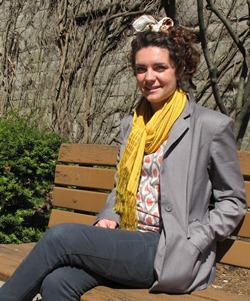Development student intrigued by little-known Chinese region
June 20, 2013
Share
By Wanda Praamsma, Communications Officer
 Queen's in the World
Queen's in the WorldCarolyn Richardson (Artsci’13) is fascinated – no, obsessed – with a region in northwest China that borders Kyrgyzstan, Tajikistan, Afghanistan and Pakistan. For several years, she’s plunged into research about China’s Xinjiang province, intrigued by its blended Middle Eastern and Chinese culture, and the predominantly Muslim Uyghur population.
 Carolyn Richardson
Carolyn Richardson“I have always been interested and focused on Middle Eastern politics and Islam so I immediately gravitated toward this area,” says Ms. Richardson, a graduate of Queen’s Global Development Studies. “There are amazing mosques with Chinese architecture and everything’s written in both Chinese and Arabic characters. And it is not a well-known region, which makes it more intriguing.”
Awarded a Pathy Family Foundation (PFF) Community Leadership Fellowship this year, Ms. Richardson now has the opportunity to go to Xinjiang. She’ll spend a year there working to develop a handicraft cooperative for Uyghur women – an important project, given economic changes in the region.
The city of Kashgar in Xinjiang province is a special economic zone, with little to no trade restrictions, and is an international hub. The liberal business environment is making it easy for large, multi-national corporations to come in and set up factories. This threatens the traditional cultures in several ways, but particularly affects women, who are often pulled first to work in factories. Many women who have traditionally made crafts to sell will no longer have this option and will lose the skills used to make beautiful products such as hats, rugs, blankets and other tapestries.
Ms. Richardson’s work in the area will focus on helping the women set up viable craft businesses. She’ll work in conjunction with an established group, the Canyou Kashgar cooperative. “These crafts are cultural symbols,” she says. “It’s very important for women to have the opportunity to make these crafts and take control of their own financial situation.”
The Kashgar area is not the easiest place for a westerner to be and Ms. Richardson is very conscious of the longstanding ethnic conflict between the Uyghurs and the Han Chinese, which plays into the economic struggles.
But she is hopeful she can make some change and she is grateful to have several contacts in the area, mainly through a good friend from Queen’s, student Subhi Tarim (Artsci’13), who grew up in Hotan, Xinjiang.
“The project was my idea but I could not fathom putting it together without her. She speaks Han Chinese, Uyghur, Mandarin and English – she’s amazing,” says Ms. Richardson. “Her father runs a jade business there and the family has been able to open so many doors for me. It makes me feel much more secure to have these contacts.”
Ms. Richardson leaves for Kashgar in August.
The PFF Community Leadership Program, established in 2011, is funded by the Pathy Family Foundation and administered by the Queen’s University International Centre (QUIC). It offers Queen’s undergraduate or master’s students up to $30,000 for eight- to 12-month fellowships promoting social change in international locations. The pilot program runs until 2014.